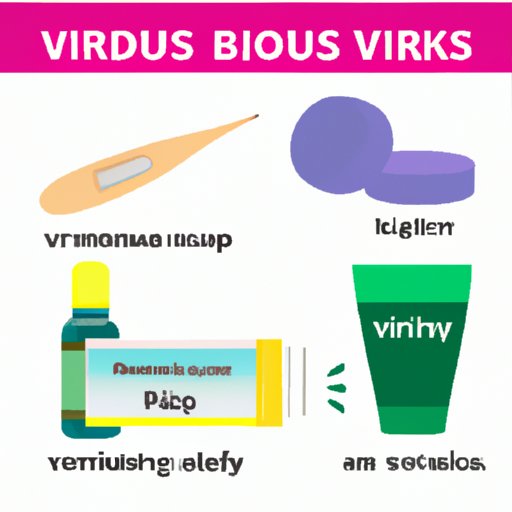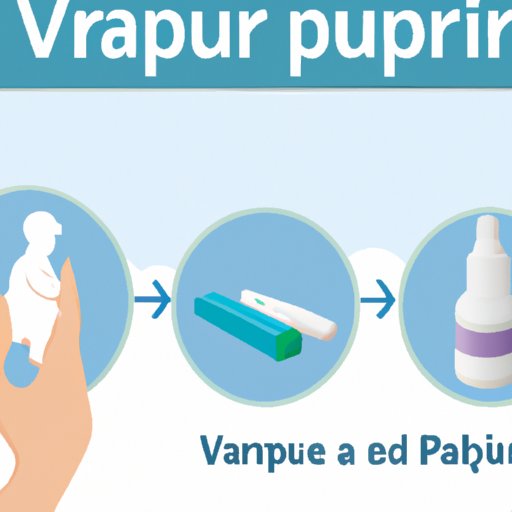I. Introduction
Are you expecting a baby and wondering whether it is safe to use Vicks Vaporub when you have a cold or nasal congestion? Many pregnant women face this dilemma, as they want to alleviate their symptoms but worry about the potential risks to their developing fetus. In this article, we will explore the scientific evidence, doctor recommendations, natural remedies, and personal experiences related to Vicks Vaporub use during pregnancy. Our goal is to help you make informed decisions about your health and safety.
II. The Dos and Don’ts of Medication Use During Pregnancy: Can Vicks Vaporub be Harmful to Your Baby?
It is essential to be cautious when taking any medication during pregnancy, as some drugs can have harmful effects on the developing fetus. Vicks Vaporub is a topical ointment that contains several ingredients, such as camphor, eucalyptus oil, and menthol, which may have both benefits and risks.
1. Overview of the ingredients
Camphor and eucalyptus oil are known to have a cooling and soothing effect on the respiratory system, while menthol can help reduce inflammation and congestion. However, high concentrations of these ingredients can be toxic if ingested or absorbed through the skin, leading to side effects such as nausea, vomiting, seizures, and even death in severe cases.
2. Research-based evidence
Studies on the safety of Vicks Vaporub during pregnancy are limited and inconclusive. Some research suggests that the ointment may cause respiratory distress and birth defects in animal models, while others report no adverse effects in pregnant women using it as directed. However, it is crucial to note that these findings are not definitive and do not necessarily apply to human beings.
Given the lack of clear evidence and the potential risks, many doctors recommend that pregnant women avoid using Vicks Vaporub unless necessary. If you have any concerns or questions, it is best to consult your healthcare provider before using the product.
B. What do doctors recommend in the situation?
Fortunately, there are several natural remedies and preventive measures that can help alleviate the symptoms of nasal congestion during pregnancy without exposing your baby to potential harm. Here are some doctor-recommended alternatives to using Vicks Vaporub:
III. Natural Remedies for Congestion During Pregnancy: Take a Pass on Vicks Vaporub
1. Honey and lemon
Mixing a teaspoon of honey with a few drops of fresh lemon juice and hot water can help soothe an irritated throat and reduce coughing. However, pregnant women should avoid consuming raw or unpasteurized honey due to the risk of bacterial contamination and possible adverse reactions.
2. Saline nasal drops
Using saline nasal drops or sprays can help moisten and clear the nasal passages without causing any harm to the baby. You can buy commercial saline solutions or make your own by dissolving a quarter teaspoon of salt in eight ounces of warm water.
3. Essential oils
Using essential oils such as lavender, peppermint, or eucalyptus oil in a diffuser or a steam bath can help relieve congestion and promote relaxation without the risks associated with Vicks Vaporub. However, it is essential to use high-quality, therapeutic-grade oils and avoid applying them directly to the skin or inhaling them for extended periods.
IV. A Mother’s Experience with Vicks Vaporub During Pregnancy
While scientific evidence and doctor recommendations provide valuable insights, personal experiences can offer unique perspectives and insights into the risks and benefits of Vicks Vaporub use during pregnancy. Here is a story of a pregnant woman who has firsthand experience with the product:
A. Personal story of a pregnant woman who used Vicks Vaporub
“I was seven months pregnant with my second child when I caught a cold that left me with a stuffy nose and coughing. Since I had used Vicks Vaporub before and found it effective, I decided to use it again, even though I knew there were mixed opinions about its safety during pregnancy. I applied a small amount to my chest and throat before going to bed and went to sleep.
1. When did she use it?
The next morning, I woke up feeling much better, with clearer nasal passages and fewer coughs. However, as the day progressed, I started feeling dizzy, nauseous, and weak. I could hardly eat or drink anything and had to lay down most of the time. The symptoms lasted for about two days and gradually disappeared, but I never used Vicks Vaporub again during my pregnancy.
2. How did it affect her and her baby?
I did not notice any significant effects on my baby’s development or health, but I was worried that I had exposed him to unnecessary risks. After doing some research and talking to my doctor, I learned that Vicks Vaporub could cause respiratory distress and irritate the skin, among other things. I regretted my decision to use it, but I also learned to be more cautious and informed about what I put on my body during pregnancy.”
B. Discussion of the potential risks
While the above story is not representative of all pregnant women’s experiences or outcomes, it does highlight the potential risks and consequences of using Vicks Vaporub when pregnant. The fact that the woman experienced adverse effects shortly after using the ointment suggests that it may have been the cause of her symptoms. However, it is essential to note that other factors could have contributed to her illness or that she might have used too much of the product. Additionally, every woman’s body is different, and what works for one person may not work for another.
1. Reflections and insights
As the mother in the above story learned, using Vicks Vaporub while pregnant is not a decision to be taken lightly, and it is crucial to weigh the potential risks and benefits before using it. Natural remedies such as saline drops, honey and lemon, and essential oils can be safer and equally effective in treating common cold symptoms without exposing your baby to harm.
2. Lessons learned
If you do decide to use Vicks Vaporub during pregnancy, it is best to follow these precautions:
- Only use a small amount and apply it to your chest or throat, not your nose or eyes.
- Avoid inhaling the vapors directly or using a humidifier or steam inhaler with the ointment.
- Stop using it if you experience any side effects such as rash, breathing difficulties, or nausea.
- Consult your doctor or pharmacist before using it if you have any underlying health conditions or are taking other medications.
V. The Science Behind Vicks Vaporub: Is it Safe to Use While Pregnant?
To answer the question of whether Vicks Vaporub is safe to use during pregnancy, we must examine the scientific evidence and study the potential risks and benefits. Here are some of the key findings:
1. Overview of scientific research
Most of the studies on the safety of Vicks Vaporub during pregnancy are animal studies, which have limitations in their applicability to humans. Some research suggests that exposure to high levels of camphor and eucalyptus oil, two of the main ingredients in Vicks Vaporub, can cause fetal malformations and developmental abnormalities in mice and rats. However, the doses used in these studies were much higher than those typically used in human treatments. Other studies that have examined the effectiveness of Vicks Vaporub in treating common cold symptoms have reported conflicting results and have not shown any significant adverse effects in pregnant women.
2. Recommendations on whether or not it is safe
Given the lack of clear evidence and the potential risks, many doctors advise pregnant women to avoid using Vicks Vaporub as a precautionary measure. If you have any concerns or questions, it is best to consult your healthcare provider before using the product. As with any medication or treatment, the benefits of Vicks Vaporub should be balanced against the potential risks, taking into account your individual circumstances and health status.

VI. Pregnancy and Vicks Vaporub: What You Need to Know
In summary, Vicks Vaporub is a topical ointment used to treat common cold symptoms that contain several ingredients with potential health risks for pregnant women. While the available scientific evidence is inconclusive and conflicting, many doctors recommend avoiding the product during pregnancy and opting for natural remedies or preventive measures instead.
A. Straightforward overview of the potential risks and benefits
Here is a quick summary of what you need to know about using Vicks Vaporub during pregnancy:
- While the risks of using Vicks Vaporub during pregnancy are not fully understood, some of its ingredients may have potential adverse effects on the developing fetus.
- Many natural remedies such as saline drops, honey and lemon, and essential oils can effectively treat common cold symptoms without exposing your baby to harm.
- Consult your doctor or pharmacist before using Vicks Vaporub or any other medication during pregnancy to ensure its safety and effectiveness for your specific condition.
B. FAQs and common concerns
Here are some answers to the most common questions and concerns regarding Vicks Vaporub and pregnancy:
1. How safe is it?
The safety of Vicks Vaporub during pregnancy is uncertain, and many doctors advise pregnant women to avoid using it as a precautionary measure. The best way to promote your health and safety during pregnancy is to consult your doctor or pharmacist before using any medication or treatment.
2. What are the alternatives?
Natural remedies such as saline drops, honey and lemon, and essential oils can be safe and effective alternatives to Vicks Vaporub for treating common cold symptoms during pregnancy. It is also essential to practice good hygiene, such as washing your hands frequently, avoiding close contact with sick people, and staying hydrated to prevent colds from happening in the first place.

VII. When to Choose Vicks Vaporub Over Other Medications During Pregnancy
If you have decided to use Vicks Vaporub during pregnancy, it’s essential to understand how it compares to other medication options and when it may be more appropriate. Here are some of the most commonly used medications for cold and flu symptoms during pregnancy:
1. Antihistamines
Antihistamines such as diphenhydramine, loratadine, and cetirizine are commonly used to alleviate sneezing, runny nose, and watery eyes that accompany allergies or colds. However, some antihistamines can cause drowsiness and have not been adequately studied in pregnant women, so their safety is uncertain.
2. Nasal sprays and drops
Nasal sprays and drops such as oxymetazoline and xylometazoline can help reduce nasal congestion by narrowing the blood vessels in the nasal passages. However, they should be used with caution, as they can cause rebound congestion and are not recommended for long-term use.
3. Decongestants
Decongestants such as pseudoephedrine and phenylephrine are commonly used to relieve nasal congestion and sinus pressure. However, they can raise blood pressure and cause other adverse effects, so their use during pregnancy is limited and monitored.
B. Explanation of how Vicks Vaporub fits into the list
Compared to other medications, Vicks Vaporub may be a relatively safer option for treating common cold symptoms during pregnancy, as it is applied topically and has not been associated with significant adverse effects in pregnant women. However, it is essential to use it as directed and be aware of the potential risks, such as skin irritation and respiratory distress.
